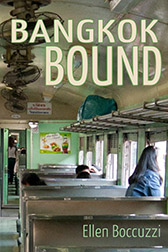Ellen Boccuzzi, Bangkok Bound
Chiang Mai: Silkworm Books, 2012. Pp. viii, 192; English and Thai references, index.
* * *
Book-length studies of the Mainland Southeast Asian literature still remain too rare. The appearance of Ellen Boccuzzi’s Bangkok Bound thus leads us to release two complimentary reviews, each written by the author of a major forthcoming work in the field of Thai literature and cultural history.
* * *
Reviewed by Martin Platt.
Anytime a new book on Thai literature is published, there is cause for celebration, partly because it is such a rare occurrence, but also because it assures the small group of us who study it that our field of study is not dead. This is especially true when the new book offers a fresh perspective and useful insights based on careful reading of Thai texts. Bangkok Bound is unique, at least among books in English on literature in Thai, in that it concentrates on a particular theme, in different works by different authors, rather than on a single author or a single work.(1) Ellen Boccuzzi here brings to light a significant aspect of modern and contemporary Thai literature that has up to now received little attention: the topic of migration. Her method is to concentrate largely on analyzing the plots and messages of short stories (mostly untranslated, and thus read in the original Thai) from the 1990s and 2000s. She supplements that analysis at times with comments from interviews with the writers themselves. The book is nicely written and easily read, flowing along smoothly and for the most part not overly freighted with fashionable theory or smothered with too much jargon.
The remainder of this review is available here.
* * *
Reviewed by Susan F. Kepner.
Ellen Boccuzzi’s book on the literature of rural-urban migration in Thailand is both fascinating in itself and excellent as a resource for teachers and students of a number of subjects relating to Southeast Asia. In her Introduction, she states that “news stories, songs, soap operas, documentaries …all depict stories of migration with portrayals that range from alarmist to stereotypical to matter-of-fact” (p. 4). Boccuzzi’s own depictions of the rural-urban migration experience are grounded in modern Thai fiction, but this is not simply a collection of translations that reflect migrants’ experiences.
The remainder of this review is available here.
 Facebook
Facebook  Twitter
Twitter  Soundcloud
Soundcloud  Youtube
Youtube  Rss
Rss 
